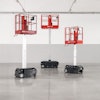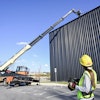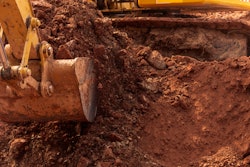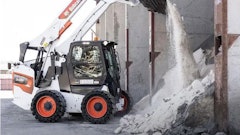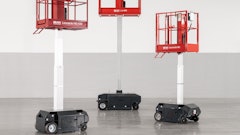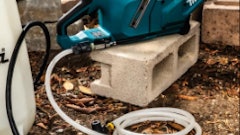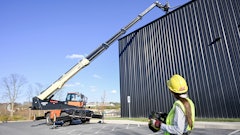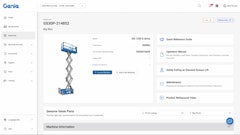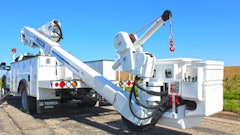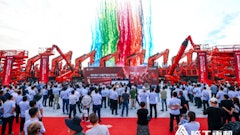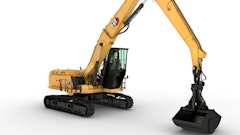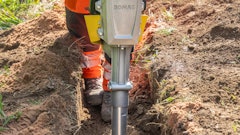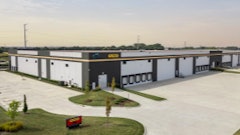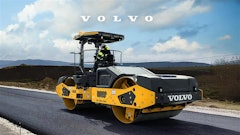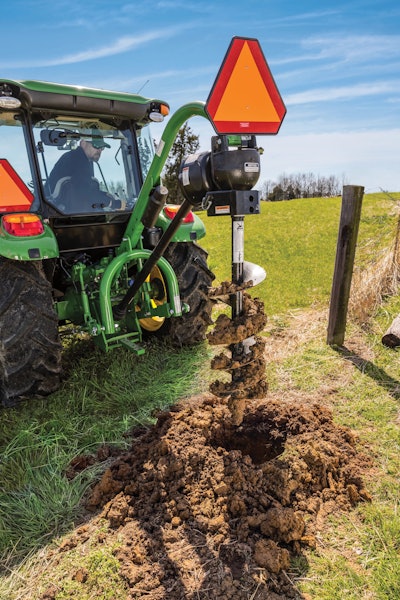
For contractors, adding attachments to a machine transforms it from a one-and-done piece of equipment to multifunctional tool—a Swiss Army knife of sorts.
“One of the sayings we had years ago was that a skid-steer without an attachment is nothing more than a rough ride,” says Shane Reardon, national account sales manager at Bobcat Co. “Attachments can be something as simple as a bucket or a set of pallet forks, but you can’t really accomplish much without the attachments on the machine.”
So, what attachments should rental companies be offering their contractor customers?
Experts from John Deere, Bobcat Co. and Case Construction Equipment discuss what rental companies should know about attachments so that they’re hooked in to their customers’ needs when the time comes.
The opportunities
Increasing contractors’ ability to complete more jobs is one plus of rental companies offering an assortment of attachments.
“Having a variety of attachments for a given machine will increase revenue because the customers can bid different jobs without having that out-of-pocket expense of buying that attachment,” says Gustav Krejcha, product manager, construction attachments, Case Construction Equipment. “With the labor market right now, one or two attachments might replace a handful of people. That attachment doesn't call in sick. That attachment doesn't take breaks. It’s about the versatility of that one machine.”
Attachment rentals can also increase rental companies’ bottom lines, especially if they’re looking to entice smaller customers with attachment rentals.
“A lot of rental companies want to differentiate themselves, and we’ve seen a shift of looking at smaller customers, with a lot of people wanting to be more self-sufficient,” says John Doyle, partnered products marketing manager at John Deere. “There are a lot of opportunities for attachments in that space.”
What to consider
Before deciding on what attachments to offer, rental companies should consider items such as the warranty offerings to ensure they protect their investment, seasonal needs and regional requirements, according to Reardon.
“If you're living in a climate with a lot of snow, for example, offering snowblowers or snow blades may boost revenue,” Reardon says. “If you're living in an area with heavy logging, for example, you may want to have a flail mower as part of your offerings. These rental houses get to know their area quite well, so they can build relationships with their customers and that drives business as well.”
To determine how many attachments they’ll need, Reardon recommends rental companies keep a “missed rental” log to see where they’ve lost business due to not having a given attachment.
“By tracking this, they can evaluate if it’s a smart business decision to purchase the attachment based on demand,” Reardon says.
Educate customers
Getting to know the customer is key when it comes to figuring out what type of attachment would best suit their needs.
To do so, rental companies can ask their potential customers questions such as:
- What will the job entail? What are you trying to accomplish?
- What type of equipment will you be using?
- What functions will the machine performing?
- What’s the horsepower on the machine?
- What sizes of the attachment will you need?
- What’s the hydraulic flow of the machine?
- What kind of hitch will you be using?
- What class machine are you using?
- If you’re using a trencher, are you trenching in a line? What size teeth with you need? Do you have the correct chains?
These types of questions will help rental houses determine what attachments are appropriate, as well as what size components are needed for the attachment (such as clamps and bits).
“That way, rental companies can tailor fit not only the machine, but also the attachments that go with it and increase revenue dollars because they’ll have more insight into what else the customer might need,” Krejcha says. “Educating the customer will enable the rental company to offer different attachments and also decrease the number of man-hours the customer will need on the jobsite.”
Reardon points out that general contractors may not need as much education as a “weekend warrior” customer that comes into the rental shop.
“At that point, it’s up to the rental house to really dig in and ask more questions,” Reardon says.
Doyle agrees.
“For someone who is more of a property owner, they’re not as equipment savvy,” Doyle says. “They might even be first-time equipment owners, so it’s up to the rental company to understand what they have to offer. Don’t make it intimidating but make an effort to understand what they’re trying to do. Create an environment in the store that’s inviting to those type of customers as well.”
Ensuring customers walk out of the rental store with the correct attachments does two things: It helps the rental company protect their equipment against additional wear and tear by abuse, and it protects the end customer by making sure they’re using the machines safely and efficiently.
“For example, if a skid-steer doesn’t provide the right amount of hydraulic flow, then the attachment is not going to work properly, and the contractor won’t get the job done in a timely manner,” Doyle says.
How to charge
Once rental houses are set on what type of attachments are needed, the question becomes how the customer should be charged for those attachments.
Krejcha says some companies may opt to charge for the machine and attachments as a package.
“They can have a set package for landscaping or a general construction package, with maybe three attachments,” Krejcha says. “From there, they can add on ad hoc attachments if needed. If the package covers three attachments, that’s a really good way for the rental companies to increase their sales without having a knee jerk reaction by the customer (on price).”
Reardon mentions that rental companies can charge more upfront for specialty attachments.
“Rental rates will vary from state to state, but the more specialized the attachment, the more you paid upfront for that purchase, the higher the rental rate you can charge the customer,” Reardon says.
Specialty attachments
In addition to conventional attachments, rental companies can also offer high-dollar specialty attachments such as forestry cutters or demolition attachments.
“Those will really be for your niche customer,” Reardon says. “But, if a rental house does have a specific attachment, it's a good win for them because they can rent that attachment for the week.”
Rental companies should also understand what attachments competitors are offering.
“If there’s a gap in your market, evaluate how regularly it would need to be rented to understand if it would be profitable for your business,” Reardon says. “Then you could become the go-to rental business for that attachment, further growing your overall business opportunities.”


